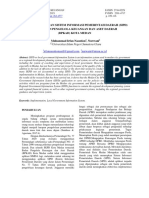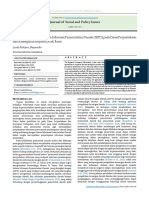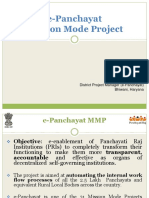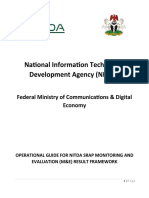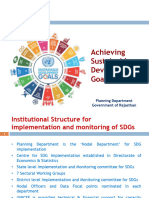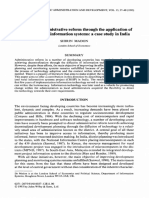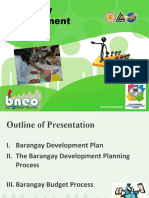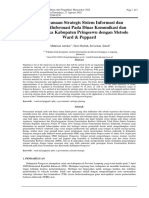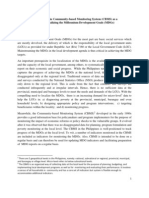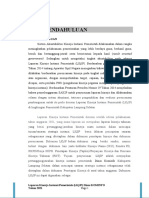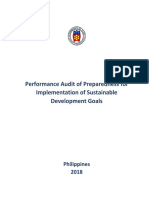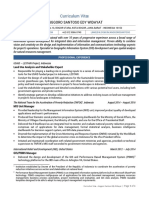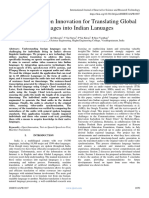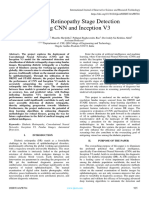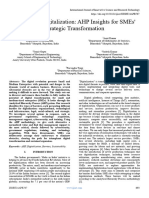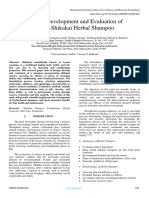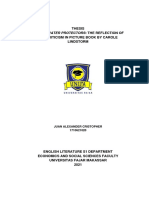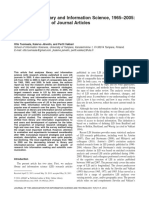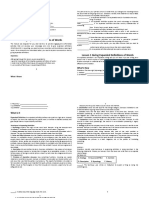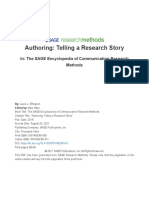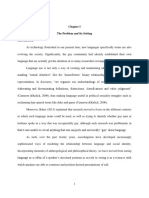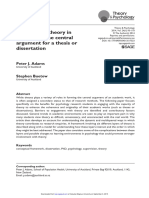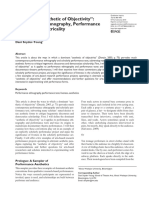Professional Documents
Culture Documents
Implementation of Regional Development Information Systems in Regional Development Planning at Bappeda of Enrekang Regency
Copyright
Available Formats
Share this document
Did you find this document useful?
Is this content inappropriate?
Report this DocumentCopyright:
Available Formats
Implementation of Regional Development Information Systems in Regional Development Planning at Bappeda of Enrekang Regency
Copyright:
Available Formats
Volume 8, Issue 1, January – 2023 International Journal of Innovative Science and Research Technology
ISSN No:-2456-2165
Implementation of Regional Development Information
Systems in Regional Development Planning at
Bappeda of Enrekang Regency
Sri Wahyuni1, Rahmatia1, Lukman Irawan1
1
Regional Planning and Development Study Program, Graduate School, Hasanuddin University, Indonesia
Abstract:- This study aims to analyze the implementation Planning in the current era, namely Regional Development
of the Regional Development Information System (SIPD) Planning which pay attention to the potential and specific
in Regional Development Planning at Bappeda of characteristics of each region.
Enrekang Regency. The type of research used is a
qualitative method with a descriptive approach. Data Meanwhile, National Planning is more macro in nature
collection techniques used purposive sampling techniques and only provides general directions and targets so that
and data analysis techniques using Nvivo12 Plus software. Regional Development can be well coordinated as well as
The results of the study show that the implementation of efficient. In order for regional and central development to
the Regional Development Information System (SIPD) in remain in good synergy, a regulation was made to strengthen
terms of policy content and policy environment has been the position of Regional Development Planning in Indonesia,
implemented properly, it's just that there are still a namely through Law Number 25 of 2004 concerning the
number of inputs that need to be considered, such as the National Development Planning System (SPPN 2004).In
need for stages of technical training carried out by the Article 31 in Chapter VII of Law Number 25 of 2004
Ministry of Home Affairs or Bapedda of Enrekang concerning the National Development Planning System, it
Regency, there is a need for relevance between the states that development planning is based on accurate and
knowledge capabilities of employees with aspects of tasks accountable data/information.Data/information is one of the
that are more relevant as well. materials for evaluating the implementation of Regional
Development Planning as well as material for
Keywords:- Implementation of Regional Development determining/formulating policies and planning for regional
Information Systems; Development Planning. development. This explanation can be interpreted that in order
to be able to prepare good and quality Regional Development
I. INTRODUCTION Planning, an accurate, accountable and relevant reference data
is needed.
Since the implementation of the regional autonomy
system in Indonesia, it has encouraged changes in the Therefore, local governments need a system or
implementation of Governance and Development. Particularly application that can become a database center that can be
in development changes, it does not only occur at the central trusted and accurate in presenting data. Also, so that data can
level but also at the city and district levels. The latest be integrated starting from the lowest level of government,
regulations governing changes to the administration of namely at the village level. The system in question is a digital-
regional government and development are Law Number 23 of based system that can help facilitate the preparation of
2014 concerning Regional Government and Law Number 9 of Regional Development Planning starting from the stages of
2015 concerning Amendments to Law Number 23 of 2014 preparing plans, establishing plans, controlling the
concerning Regional Government. One of the quite implementation of plans, and evaluating the implementation of
fundamental changes in the Administration of Regional plans both in the Regional Long-Term Development Plan
Governments mentioned in the regulation is related to regional (RPJPD),
development.Regional development is said to be the
embodiment of the implementation of government affairs Regional Medium-Term Development Plan (RPJMD)
which have been partially handed over to the regions as an and Regional Government Work Plan (RKPD) [1]. The
integral part of National Development. Through this policy, it Regional Development Information System, abbreviated as
means that regional governments are given broader authority SIPD, is the management of regional development
in managing and regulating government administration information, regional financial information, and other regional
affairs.The application of regional autonomy has limited the government information that are interconnected to be utilized
scope of authority of the central government in terms of in implementing regional development. SIPD is a system that
managing development at the regional level. So that the documents, administers, and processes regional development
Regional Development Planning System which was originally data into information that is presented to the public and as
more regional in nature has become more participatory. In material for decision-making in the framework of planning,
addition, changes that are visible in Regional Development implementing, evaluating local government performance [2].
IJISRT23JAN518 www.ijisrt.com 1024
Volume 8, Issue 1, January – 2023 International Journal of Innovative Science and Research Technology
ISSN No:-2456-2165
The following figure 1. presents an overview of the Regional 2014 concerning Regional Development Information Systems
Development Information System (SIPD) menu. (SIPD). Based on the Regulation of the Minister of Home
Affairs Number 8 of 2014 concerning Regional Development
Information Systems (SIPD), requires a Decree on
establishing a Regency/City Working Group Team (Pokja) to
Manage Regional Development Information Data, and the
Formation of a Regency/City Regional Development
Information System Management Team (SIPD).
However, based on data obtained from the Directorate
General of Regional Development at the Ministry of Home
Affairs, there are 211 regencies where regional government
data availability has been integrated with SIPD. Meanwhile,
Enrekang Regency was found to be still not integrated with
SIPD (e-planning and RKPD). The following is the
information presentation through Figure 2:.
Fig. 1: overview of the Regional Development Information
System (SIPD) menu
SIPD is a development data management application
created, managed and developed by the Director General of
Regional Development of the Ministry of Home Affairs [3].
The data in the SIPD application is processed and presented in
the form of regional development information with the hope
that it can increase understanding, be guided and implemented
as a reference for provincial and district/city governments in
order to improve the quality of regional development
planning, control and evaluation.This SIPD can assist
Regional Heads/Heads of Agencies/Heads of Agencies/Heads
of Offices/Heads of Work Units in obtaining accurate Fig. 2: SIPD (e-planning and RKPD)
information and data. The SIPD application is integrated in
stages, making it easier for users from the lowest level, Source: https://sipd.go.id/sipdmap/
namely the village, to manage data on proposals or community
complaints that have been discussed, proposal data entered by From the results of the researcher's initial observations,
villages can be arranged based on priority, and villages can several problems were found in the Implementation of the
also manage proposal data which will later be will be raised to Regional Development Information System (SIPD) in
the sub-district, then will be sent to a higher level, namely the Regional Development Planning at the Bappeda of Enrekang
Regional Development Planning Agency (BAPPEDA) as the Regency, namely not massive coordination between
development actors, such as between OPD/SKPD and
planning manager.
Bappeda. so that it was constrained in data entry to SIPD, and
BAPPEDA as a regional planning institution has been in the end Enrekang Regency was included in the five
confirmed through formal legitimacy, namely Law Number 25 regencies in South Sulawesi which were categorized as having
of 2004 concerning the National Development Planning Regional Government data that had not been integrated into
System. BAPPEDA is a regional institution that has received SIPD. Another problem is the limited proportion of budget
the mandate or mandate to carry out the coordinating function allocation and human resources involved in identifying
of development planning within the scope of regional development data, as a result of which the data collection
government organizations BAPPEDA is a regional planning cannot obtain optimal and maximum results.Some previous
institution that has been confirmed through formal legitimacy studies that support the results of the researchers' initial
in Law Number 25 of 2004 concerning the National observations, namely [4] with the title Utilization of Regional
Development Planning System.The Enrekang District Information Systems in Supporting Regional Development
Government is one of the regencies that has made preparations Planning in Indonesia, found several problems that occurred
for the preparation and development of SIPD data and such as weak understanding, coordination and commitment of
information. In the 2021 fiscal year, BAPPEDA has started to local governments in using SIPD as a basis for preparing and
make adjustments during the transition period, from the old evaluation of regional planning/legal database; the data is still
system to the new system, namely SIPD. The activities for partial in the regions so that it varies and the conditions for
preparing the Regional Development Information System filling in the SIPD data elements are incomplete and not
(SIPD) are regulated by the Ministry of Home Affairs by updated; Limited professional human resources; Infrastructure
issuing Minister of Home Affairs Regulation Number 8 of limitations; and budget limitations.
IJISRT23JAN518 www.ijisrt.com 1025
Volume 8, Issue 1, January – 2023 International Journal of Innovative Science and Research Technology
ISSN No:-2456-2165
Furthermore, from the results of research by [5] with the predetermined research indicators. The coding process is
title Implementation of Regional Development Information adapted to the theory that has been used. Classifying data as a
Systems (SIPD) in Improving Regional Development process of translating data coding, classifying the
Coordination, Studies on the Implementation of SIPD in classification process using Nvivo crosstabulation,
BAPPEDA Bengkulu City. The results of his research stated crosstabulation as a process of comparing each data. The last
that even though the SIPD Implementation at BAPPEDA stage in the nvivo analysis process is the display of data in the
Bengkulu City was in accordance with applicable regulations. form of graphs and tables, this analysis model in Nvivo is
However, there are still some obstacles, such as the lack of called the five-step analysis.
awareness of SIPD executors about the implementation of
SIPD which can be seen from the level of filling out of SIPD III. RESULTS AND DISCUSSION
data in the city of Bengkulu. In addition, the implementing
regulations related to administrative sanctions for the person A. Implementation of the Regional Development Information
in charge of SIPD have not been maximized to increase the System (SIPD) in Regional Development Planning at
level of compliance in filling in data. Bappeda of Enrekang Regency
In addition, [2] in his research on the application of
SIPD at the Regional Development Planning Agency of
Indragiri Hilir Regency, found results that based on analysis
with the theory of Support, Capacity, and Value the
application of SIPD was quite good, but the data elements
were not fully met, this was due to due to inadequate human
resources in terms of data input, where each regional
government organization operator has multiple positions as
operator in other systems.Ideally, in the development planning
process accompanied by complete and comprehensive data, it
is an important point for the success of regional development.
Therefore, a valid and measurable database and information is
needed. So, if the input data is inaccurate, the resulting
development plan will not solve the existing problems. Thus,
as an important point in the planning input stage, valid,
updated and accountable data and information bases are Fig. 3: SIPD Program Data
needed as well as analysis of regional development that can
describe the condition of the region as a whole [6]. So that it is Source: Admin of Regional Devices, 2019
hoped that the output of regional development planning in the
In implementing a policy there are four aspects that must
form of development plan documents is able to answer
be considered, namely: (1) Who is involved in the
development problems and achieve development targets [7] .
implementation; (2) The nature of the administrative process;
The purpose of this study was to determine the
(3) Compliance with a policy; and (4) Effect or impact of
Implementation of the Regional Development Information
implementation [10]. This view shows that policy
System (SIPD) in Regional Development Planning at the
implementation is a dynamic process that involves continuous
Bappeda of Enrekang Regency.
efforts to achieve what leads to the placement of a program
II. METHODS into the desired decision goals. The successful implementation
of a public policy can be measured from the process of
This type of research uses qualitative methods [8] achieving the final results (outcomes), namely whether or not
qualitative research methods try to find the meaning of a the objectives to be achieved are achieved.The public policy
phenomenon that comes from the views of the implementation approach proposed by Grindle is known as
participants.Regional Development Information System "implementation as a political and administrative process".
(SIPD) in Regional Development Planning at Bappeda Where the measurement of the success of the implementation
Enrekang Regency. Interviews were used with structured of the policy is seen from two things, namely the content of
methods on research objects and documentation techniques the policy, including, first, the interest that influences (interest
with literature reviews, journals, related regulations, statistical effected). Second, Type of Benefits, Third, Degree of change
data, previous research and similar research. This research was to be achieved (Extent Of Change Envision), Fourth, Location
analyzed using Nvivo12 Plus software, namely by analyzing of decision making (Site Of Decision Making), Fifth,
and describing the Implementation of Regional Development Implementation of the program (Program Implementer), Sixth,
Information Systems (SIPD) in Regional Development Resources used (Resources Committed). Then the
Planning at Bappeda Enrekang Regency. The research data implementation environment (Context OI implementation),
that has been collected through interviews is processed includes: Power, interests and strategies of the actors involved
through Nvivo, the interview data is matched with (Power, Interest, and Strategy of Actor Involved),
IJISRT23JAN518 www.ijisrt.com 1026
Volume 8, Issue 1, January – 2023 International Journal of Innovative Science and Research Technology
ISSN No:-2456-2165
Characteristics of institutions and regimes in power Benefit Type
(Institution and Regime Characteristics), Level of compliance At this point the content of the policy seeks to show or
and response from implementers (Compliance and explain that in a policy there must be several types of benefits
Responsiveness) [11]. that show a positive impact. Program implementation can be
said to be successful if the program has the desired impact. A
B. Policy Content program may be viewed from a process standpoint, but may
fail when viewed from what is produced.The criteria for
Target Group Interests measuring implementation success are based on three aspects,
The target group is a group of people or organizations in namely (1) the level of bureaucratic compliance with the
society who will receive goods and services or whose behavior bureaucracy above it or the level of bureaucracy as stipulated
will be influenced by policies. Policy implementation depends in the law; (2) there is a smooth routine and there are no
on policy implementers (implementors) and target groups problems; (3) the desired implementation and impact or
(target groups). Implementers must have the capability, benefits of all existing programs are directed [12]. Based on
competence, commitment and consistency to implement a this theory it can be said that the success of a program
policy in accordance with the directions of policy makers. In implemented is not seen only in terms of the implementation
addition, an educated and relatively homogeneous target group of the program if only seen from the process, but also must be
will more easily accept a policy than a closed, traditional and seen from the benefits arising from the program.
heterogeneous group. Furthermore, the target group which is a
large part of the population will also make it more difficult for Based on the theoretical basis and sources from
successful implementation.The implementation of a interview informants regarding the types of benefits from
government system that uses (electronic) technology is to SIPD implementation, it can be concluded that the results and
utilize information and communication technology in the impacts obtained from a policy are very important to measure
framework of developing services for the community which is the success or failure of a policy so that it can become material
expected as a form of encouragement (Presidential Regulation, in formulating a policy. . Regarding the benefits of SIPD at
2018). The Regional Government Information System (SIPD) Bapedda, Enrekang Regency, it is considered that it has been
is very well implemented. This system was implemented to running well, because its benefits and uses have been felt by
encourage the implementation of effective, innovative and the relevant regional apparatus and apparatus. This will
quality information by activating the substance of certainly support the performance and productivity of
Permendagri Number 70 of 2019 concerning Regional government institutions to realize the desired development.
Government Information Systems (Regulation of the Minister This is based on the alignment of programs in OPD that are in
of Home Affairs, 2019), in every district/city government, accordance with existing programs in the region. So that there
especially in Bapedda Enrekang Regency. are no more development programs that are not in line with
what is the vision of the region.
In accordance with the Regulation of Minister of Home
Affairs Number 98 of 2018 Concerning Regional Desired Degree of Change
Development Information Systems, article 3, which reads Of course, every policy has a target to be and want to
"Local Governments carry out mapping, collection, filling, achieve. The content of the policy to be explained must have a
validation, and evaluation of government data. Regions use clear scale. The extent to which the change is desired from the
Electronic Data/E-Database applications” (Regulation of the existence of a policy. The degree of change to be achieved
Minister of Home Affairs, 2018). So almost all regional shows how much change you want or want to achieve through
apparatuses in Indonesia have been transformed from working the implementation of a policy. If referring to the statement
manually to using electronics in carrying out their duties. The put forward by [12] said that there are 3 elements in seeing the
same is the case with the use and implementation of SIPD at success of policy implementation, (a). The compliance
Bapedda Enrekang Regency. Because it is clear legally and perspective that measures the implementation of the
SOPs are applied in an effort to streamline work. compliance of the implementing apparatus. (b). The success of
implementation is measured by the smoothness of the routine
From the results of the interview above and the source of and the absence of problems, and (c). Successful
the existing regulations, based on this, the conclusion is that implementation leads to satisfactory performance for all
the impact and benefits of SIPD are not only felt by Bapedda parties, especially the program beneficiary group.
Enrekang Regency, but this is also felt by OPD in Enrekang
Regency in managing planning and budgeting. This makes it Based on the results of the interviews conducted above,
easier for regional apparatus and apparatus to coordinate with it can be concluded that the changes that occurred in the
each other and access remotely so as to save time and be development planning stages in Enrekang Regency had a very
effective in finalizing development documents. positive impact on data collection from various OPDs.
Problems related to planning documents and inconsistencies in
development programs can be minimized. So that the
transformation of services from a manual system to an IT
IJISRT23JAN518 www.ijisrt.com 1027
Volume 8, Issue 1, January – 2023 International Journal of Innovative Science and Research Technology
ISSN No:-2456-2165
system has been going well. So that it can be said that the making problems range from everyday decisions, such as
SIPD policy in development planning has been going well. choosing an itinerary to go from one place to another, to more
complex decisions involving large numbers of individuals,
associations, or socio-economic groups. Complex decisions
generally require the development of formal methods for
dealing with them. Several methods have been proposed in the
literature, including cost-benefit analysis, statistical
techniques, evolutionary algorithms and multicriteria analysis.
Majority of decision-making methods assume a single
decision maker for simplicity, whereas real-world problems
require decisions to naturally imply multiple decision makers
with conflicting goals and different value systems [15].
Based on the theoretical statements and the results of
interviews with existing informants, it can be concluded that
the decentralization process in the SIPD policy has been
running from the center to the Bapedda of Enrekang Regency.
Fig. 4: Phased Schedule Input Process In general, those who have authority in decision-making are
the parties from the Ministry of Home Affairs who are the
Source: (Regional Device Admin, 2019)
subject of this SIPD policy to be carried out by government
The process of changing services has become a public agencies, including in this case the Bapedda of Enrekang
demand and there are clear regulations from the central Regency as the implementer.
government down to the regional governments to maximize
Program Executor
performance and provide satisfaction to the public in services.
In carrying out a policy or program, it must be supported
This will not happen without adequate policies and competent
by the existence of competent and capable policy
apparatus in running the government system. So actually, the
implementers. For the success of a policy, whether a policy
policy was designed and issued to be able to solve good
has specified the implementor in detail. In implementing a
problems and make it easier for officials and even the
policy or program, it must be supported by the existence of
community to give and get their rights and obligations as
competent and capable policy implementers for the success of
citizens in realizing development according to the UN target in
a policy.In the process of implementing a program, it can
2030 [13].
actually be successful, less successful, or fail altogether when
According to the results of the interviews conveyed by viewed from the form of the results achieved or outcomes.
the informants above, it can be concluded that in the desired Because in this process, various elements can be seen whose
stages of change from the SIPD policy it is as expected. This influence supports or hinders the achievement of program
is based on what was the obstacle prior to the implementation goals.
of this SIPD, the apparatus in the Enrekang Regency Bapedda.
In accordance with the juridical basis and what was
regional users and devices in Enrekang district. This greatly
conveyed by informants in the interviews conducted, the
facilitates the apparatus in carrying out their duties and
authors conclude that the process of implementing the SIPD
functions in processing data and preparing the data needed in
program at Bapedda Enrekang Regency has been going well.
the development planning that will be carried out. This is very
However, it is still constrained by inadequate systems and
effective because regional apparatuses who will send their
networks so that it can disrupt the performance of regional
development planning documents to their respective OPDs do
apparatus in development planning. Then the SIPD application
not need to take up more time and money, because this can
is still considered not to meet the needs of Bapedda Enrekang
already be done by sending documents to the SIPD user in
Regency because there are no features related to the process of
Bapedda Enrekang Regency.
monitoring and evaluating development programs. So that this
Location of decision making SIPD is considered not yet transparent in the development
Decision making in a policy plays an important role in the evaluation and monitoring process. Finally, related to the
implementation of a policy, whether the location of a program implementation of the program, it is considered that they have
is appropriate or not. Making a decision in a policy plays an not been optimal in providing provisioning in terms of
important role in implementing a policy, therefore in this technical training to support the performance of SIPD
section it must be explained where the decision making of a operators.
policy will be implemented. At least in analyzing decision
making there are four types of processes: individual, group,
organizational, and cooperative [14].Decision making can be
thought of as a cognitive process that results in selecting a
course of action from several alternative scenarios. Decision-
IJISRT23JAN518 www.ijisrt.com 1028
Volume 8, Issue 1, January – 2023 International Journal of Innovative Science and Research Technology
ISSN No:-2456-2165
IV. RESOURCE implementation of this SIPD, you don't have to wait for
confirmation from the Ministry of Home Affairs.
A program supported by adequate resources. The
implementation of a policy must also be supported by V. CONCLUSION
adequate resources with the aim that the implementation can
run well. management is the science and art of managing the Policy Contents; (1) Interests of the Target Group, the
process of utilizing human resources and other sources target group (target group) is a group of people or
effectively and efficiently to achieve a goal [16]. Management organizations in society who will receive goods and services
is almost the same as management, so the process of managing or whose behavior will be influenced by policies. (2) Types of
human resources cannot be separated from the process of Benefits, Policy content seeks to show or explain that in a
managing human resources in an organization, both on the policy there must be several types of benefits that show a
scale of government and private agencies. So, the conclusion positive impact. (3) The desired degree of change, the degree
from the above is that in the process of achieving goals, of of change to be achieved shows how much change one wants
course there are several components that need attention. Such or wants to achieve through the implementation of a policy;
as human resources and other resources. In order for this (4) The location of decision making, related to decision
resource to run optimally, it must be considered and managed making in the implementation of SIPD is still considered
properly. What is a need must be given in order to achieve the centralized because it must follow what is the direction of the
goal?So, to increase resources, education and training are Ministry of Home Affairs; (5) Program executors, in
needed, this is a form of activity in increasing competence and implementing the SIPD Implementation program, are part of
is an integral part of human resource management. In the Bapedda Enrekang Regency itself who are users, and OPD is
implementation of education and training, it is necessary to one of the beneficiaries of this SIPD program, while the
have effective management and proper coordination between Ministry is considered to only provide outreach at the
employees or the organizing committee regarding the training beginning and is not sustainable; (6) Resources, in terms of
that will be carried out. So that it can produce human resources, as implementers of the SIPD policy, the Ministry
resources that are reliable and have certain competencies and Bapedda of Enrekang Regency are considered not to be
according to organizational needs [17]. maximized to increase the potential of their apparatus because
the findings obtained by the authors are that before the
Therefore, to increase resources, especially human implementation of this SIPD was carried out, no stages of
resources, quality improvement is needed so that they are able technical training were carried out for users or admins in
to keep up with societal and global demands. Especially in the Enrekang Regency and OPD in Enrekang Regency.
use of electronics and compensation for apparatus in order to
improve their performance.In implementing policies, the most REFERENCES
important thing in implementing these policies is resources,
such as human resources and other resources. Without [1.] Nasution, A. I. N. 2021. Analisis Faktor Yang
resources, the process of implementing the policy will run in Mempengaruhi Keluhan Musculoskeletal Disorders
place, even if human resources are available but are not (MSDs) Pada Penjahit Rumahan Di Kelurahan
equipped with high capabilities, then this will become a Martubung Kecamatan Medan Labuhan(Doctoral
problem that can affect the performance of implementing the dissertation, Universitas Islam Negeri Sumatera Utara
policy. Therefore, it is important to clarify the division of jobs Medan).
and improve the quality of employees. [2.] Safriadi, S. 2018. Pengembangan Perguruan Tinggi
Islam Negeri Menghadapi Masyarakat Ekonomi Asean
Based on the above and the interviews conducted, the (MEA). Intelektualita, 4(1).
authors conclude that the stages of job distribution and [3.] Lestarna, G. 2018. Evaluasi Implementasi Sistem
compensation for implementing the policy already exist and Informasi pembangunan Daerah:(Studi Pada
are running, but when there are problems in the policy or Pemerintah Daerah Daerah Istimewa
technical matters of the application, this will be delegated to Yogyakarta) (Doctoral dissertation, Universitas Gadjah
the Ministry of Home Affairs.On the basis of the theory put Mada).
forward previously as well as existing regulations and sources [4.] Ruhana, F. 2017. Pemanfaatan Sistem Informasi
from informants. So, the authors conclude that in the Pembangunan Daerah dalam Mendukung Perencanaan
implementation of this SIPD they already have their respective Pembangunan Daerah di Indonesia. Jurnal Manajemen
jobs or tasks at the Bapedda Enrekang Regency level. The Pembangunan, 4(2).
budget for the implementation of the SIPD comes from [5.] Dione, F. &Faradina., U. 2020. Implementasi Sistem
Bapedda, but is not presented in a transparent manner. Then Informasi Pembangunan Daerah (SIPD) Dalam
what is most important in this implementation in terms of Meningkatkan Koordinasi Pembangunan Daerah. Jurnal
resources is that there is no special training held either from Kebijakan Pemerintahan, No.3(1). Hal.8. Publisher
the Ministry of Home Affairs or the Regional Government Institut Pemerintahan Dalam Negeri.
itself so that when there are problems related to the [6.] Bappenas. 2013. Membangun Sistem DataBase MDGs
Dan Program Pembangunan: Untuk Perencanaan dan
IJISRT23JAN518 www.ijisrt.com 1029
Volume 8, Issue 1, January – 2023 International Journal of Innovative Science and Research Technology
ISSN No:-2456-2165
Penganggaran yang Berpihak pada Masyarakat Miskin.
[online] available at
https://www.bappenas.go.id/files/1013/8070/7100/Buku
_III_Sistem_
[7.] Winarno, P.M., Kusnadi, A., & Afriliana, N. 2019.
Implementasi Sistem Informasi Pembangunan
Daerah Di Kabupaten.
[8.] Creswell, Jhon W. 2016. Research Design Pendekatan
Kualitatif, Kuantitatif, dan Mixed. Yogyakarta: Pustaka
Pelajar.
[9.] Moleong, L.J. 2010. Metodologi Penelitian Kualitatif.
Bandung: Remaja Rosdakarya.
[10.] Anderson, J.E. 2014. Public policymaking. Cengage
Learning.
[11.] Grindle, M. S. 2017. Politics and policy implementation
in the Third World (Vol. 4880). Princeton University
Press.
[12.] Ripley, R.B., & Franklin, G.A. 1986. Policy
implementation and bureaucracy (2nd ed.). The Dorsey
Press.
[13.] United Nations. 2015. Resolution adopted by the
General Assembly on 13 September 2005. United
Nations, 59(October), 1–38.
[14.] Takamiya, S. 1972. Group decision-making in Japanese
management. International Studies of Management &
Organization, 2(2), 183–196.
[15.] Chakhar, S., & Saad, I. 2014. Incorporating
stakeholders ’ knowledge in group decision-making.
Journal of Decision Systems, 37–41.
[16.] Hasibuan, M. S. P., & Hasibuan, H. M. S. P. (2016).
Manajemen sumber daya manusia. Bumi Aksara.
[17.] Rusliadi. 2020. Pengelolaan Sumber Daya Manusia
Melalui Pendidikan Dan Pelatihan Di Dinas
Kependudukan Dan Catatan Sipil Kabupaten Takalar.
Unismuh Makassar.
IJISRT23JAN518 www.ijisrt.com 1030
You might also like
- Penerapan Sistem Informasi Pemerintahan Daerah (Sipd) Dalam Perencanaan Pembangunan Daerah Di Bapelitbang KotaDocument9 pagesPenerapan Sistem Informasi Pemerintahan Daerah (Sipd) Dalam Perencanaan Pembangunan Daerah Di Bapelitbang Kotalitbang rohulNo ratings yet
- 4577 12256 1 PBDocument8 pages4577 12256 1 PBHMR SILOGNo ratings yet
- Implementasi SIPD pada Dinas Perpustakaan Aceh BaratDocument7 pagesImplementasi SIPD pada Dinas Perpustakaan Aceh BaratRider Sejati 007No ratings yet
- e-Panchayat MMP: Transforming Panchayati Raj InstitutionsDocument16 pagese-Panchayat MMP: Transforming Panchayati Raj InstitutionsTushar GuptaNo ratings yet
- NCDDP AF Sub-Manual - M - E, Aug2021Document273 pagesNCDDP AF Sub-Manual - M - E, Aug2021Tristan del RosarioNo ratings yet
- 1061-Article Text-3592-1-10-20200630Document8 pages1061-Article Text-3592-1-10-20200630zhonata marcallino lodayahNo ratings yet
- NCDDP Af Sub-Manual M - E, Aug2021Document273 pagesNCDDP Af Sub-Manual M - E, Aug2021Michelle ValledorNo ratings yet
- Establishing a Barangay Database for Improved Local PlanningDocument9 pagesEstablishing a Barangay Database for Improved Local Planningjon rey lumayag0% (1)
- Imuo Prodoc (Final)Document68 pagesImuo Prodoc (Final)Desigka 01No ratings yet
- NITDA SRAP M&E GuideDocument14 pagesNITDA SRAP M&E GuideHamza KaniNo ratings yet
- 9-10 September 2009 MIS-Workshop: Strengthening of MIS in District ShivpuriDocument20 pages9-10 September 2009 MIS-Workshop: Strengthening of MIS in District ShivpuriShafqat HussainNo ratings yet
- 4246 12128 1 PBDocument5 pages4246 12128 1 PBfeibiNo ratings yet
- The Impact of Implementing The Regional Development Information System (SIPD) On The Effectiveness of Village Organizations Through Employee Performance in The Malang City GovernmentDocument7 pagesThe Impact of Implementing The Regional Development Information System (SIPD) On The Effectiveness of Village Organizations Through Employee Performance in The Malang City GovernmentInternational Journal of Innovative Science and Research TechnologyNo ratings yet
- 12th Nov NAG 2611101Document138 pages12th Nov NAG 2611101Brijesh_Kumar_6320No ratings yet
- Revised PC-I 2011-2014Document14 pagesRevised PC-I 2011-2014Tourismsportyouthaffair MuseumarchaeologyNo ratings yet
- RuTIMS CSM Combined Closing Report Final Sep 22Document18 pagesRuTIMS CSM Combined Closing Report Final Sep 22Jaljala Nirman100% (1)
- ICOIR 2016 Full Eng SuprajakaDocument10 pagesICOIR 2016 Full Eng SuprajakaSendy Ayu YulytaNo ratings yet
- Jurnal TepDocument21 pagesJurnal TepIkfad KurniaNo ratings yet
- CreationofaVillageInformationSystem PDFDocument5 pagesCreationofaVillageInformationSystem PDFAr Gurpal KaurNo ratings yet
- Mapa Puta EngDocument15 pagesMapa Puta EngjimhudoNo ratings yet
- Chandigarh's e-Governance Roadmap Under NeGPDocument125 pagesChandigarh's e-Governance Roadmap Under NeGPShrijendra ShakyaNo ratings yet
- 001 Mya TarDocument17 pages001 Mya TarPedro FerreiraNo ratings yet
- Kalinga PDPFP 2017-2022 - 1st DraftDocument222 pagesKalinga PDPFP 2017-2022 - 1st Draftlorraine ngao-iNo ratings yet
- E PanchyatDocument64 pagesE PanchyatmatchisNo ratings yet
- RajasthanDocument8 pagesRajasthankhusiverma563No ratings yet
- Government of Pakistan: Planning Commission Ministry of Planning, Development & Reform MARCH, 2018Document26 pagesGovernment of Pakistan: Planning Commission Ministry of Planning, Development & Reform MARCH, 2018Dilawar HussainNo ratings yet
- 3Document1 page3Arooj FaheemNo ratings yet
- Overview of The PSDP For IACMAS Epp RevDocument14 pagesOverview of The PSDP For IACMAS Epp RevHarley pacoliNo ratings yet
- Article - Introducing Administrative ReformDocument12 pagesArticle - Introducing Administrative ReformShivangi SharmaNo ratings yet
- Barangay Development Planning GuideDocument34 pagesBarangay Development Planning GuideEd Seng100% (1)
- Ict Road MapDocument40 pagesIct Road MapIdris AlfassiNo ratings yet
- Terms of Reference: General InformationDocument6 pagesTerms of Reference: General InformationmidrisNo ratings yet
- NITDA Strategic Roadmap and Action Plan (SRAP) Implementation ProgramDocument21 pagesNITDA Strategic Roadmap and Action Plan (SRAP) Implementation ProgramHamza KaniNo ratings yet
- 1 Guidelines On The Preparation of Local PlansDocument31 pages1 Guidelines On The Preparation of Local PlansziledefretxedNo ratings yet
- Hambatan E-Government - PresentasiDocument18 pagesHambatan E-Government - Presentasidev akbarNo ratings yet
- State of Local Governance Report 2011Document103 pagesState of Local Governance Report 2011Vincent Bautista100% (1)
- Strategi Pemerintah Kota Bogor Dalam Penerapan SIPD: Bogor City Government Strategy in Implementation of SIPDDocument14 pagesStrategi Pemerintah Kota Bogor Dalam Penerapan SIPD: Bogor City Government Strategy in Implementation of SIPDLA ODE MUHUNINo ratings yet
- 3242 7205 1 PBDocument8 pages3242 7205 1 PBAnbu KakaNo ratings yet
- Infrastructure Capacity Building Program in The Implementation of The Regional Medium - Term Development Plan of West Sulawesi Province 2017 - 2022Document7 pagesInfrastructure Capacity Building Program in The Implementation of The Regional Medium - Term Development Plan of West Sulawesi Province 2017 - 2022International Journal of Innovative Science and Research TechnologyNo ratings yet
- Matecconf Icesti2018 01018Document8 pagesMatecconf Icesti2018 01018umprotNo ratings yet
- BD 2 PDFDocument240 pagesBD 2 PDFlizakhanamNo ratings yet
- Advertisement YPs Consultant Revised PDFDocument11 pagesAdvertisement YPs Consultant Revised PDFHarish MannNo ratings yet
- Philippines Proposal CBMSDocument13 pagesPhilippines Proposal CBMSEdward Bertiz BarotillaNo ratings yet
- DP3 Final Evaluation 12-11-2008Document25 pagesDP3 Final Evaluation 12-11-2008Dalia Abdel-RahmanNo ratings yet
- NITDA ROADMAP Corrected Section ADocument43 pagesNITDA ROADMAP Corrected Section AHamza KaniNo ratings yet
- Tech 4 For LrmisDocument20 pagesTech 4 For LrmissishirNo ratings yet
- Bab IDocument17 pagesBab IrvxtmaNo ratings yet
- Six TransformationalDocument51 pagesSix Transformationaldevinder1971No ratings yet
- NSDI Strategic Actions Plan-4Document69 pagesNSDI Strategic Actions Plan-4Vladica MaricNo ratings yet
- SDG Filipine 2018Document52 pagesSDG Filipine 2018stiribuneNo ratings yet
- Enhanced BDP, Investment & BudgetingDocument24 pagesEnhanced BDP, Investment & BudgetingMicky MoranteNo ratings yet
- URDPFI Guidelines Vol IDocument448 pagesURDPFI Guidelines Vol Isusmita sethiNo ratings yet
- City Development Plan - GuwahatiDocument165 pagesCity Development Plan - GuwahatimunindersinghNo ratings yet
- Gis Mgnrega 27062016Document32 pagesGis Mgnrega 27062016Lakhvir Singh100% (1)
- KADIWA (Project Proposal)Document7 pagesKADIWA (Project Proposal)Elmer Datuin50% (2)
- Curriculum Vitæ Widayat PDFDocument4 pagesCurriculum Vitæ Widayat PDFpolyethileneNo ratings yet
- Government of Khyber Pakhtunkhwa Science & Technology and Information Technology DepartmentDocument17 pagesGovernment of Khyber Pakhtunkhwa Science & Technology and Information Technology DepartmentAwami National PartyNo ratings yet
- SADC Regional Infrastruture DevelopmentDocument108 pagesSADC Regional Infrastruture DevelopmentChishale FridayNo ratings yet
- Reaching the Sustainable Development Goals Through Better Local-Level Data: A Case Study on Lumajang and Pacitan Districts in IndonesiaFrom EverandReaching the Sustainable Development Goals Through Better Local-Level Data: A Case Study on Lumajang and Pacitan Districts in IndonesiaNo ratings yet
- Snapshot of Sustainable Development Goals at the Subnational Government Level in IndonesiaFrom EverandSnapshot of Sustainable Development Goals at the Subnational Government Level in IndonesiaNo ratings yet
- Compact and Wearable Ventilator System for Enhanced Patient CareDocument4 pagesCompact and Wearable Ventilator System for Enhanced Patient CareInternational Journal of Innovative Science and Research TechnologyNo ratings yet
- Insights into Nipah Virus: A Review of Epidemiology, Pathogenesis, and Therapeutic AdvancesDocument8 pagesInsights into Nipah Virus: A Review of Epidemiology, Pathogenesis, and Therapeutic AdvancesInternational Journal of Innovative Science and Research TechnologyNo ratings yet
- Implications of Adnexal Invasions in Primary Extramammary Paget’s Disease: A Systematic ReviewDocument6 pagesImplications of Adnexal Invasions in Primary Extramammary Paget’s Disease: A Systematic ReviewInternational Journal of Innovative Science and Research TechnologyNo ratings yet
- Smart Cities: Boosting Economic Growth through Innovation and EfficiencyDocument19 pagesSmart Cities: Boosting Economic Growth through Innovation and EfficiencyInternational Journal of Innovative Science and Research TechnologyNo ratings yet
- Air Quality Index Prediction using Bi-LSTMDocument8 pagesAir Quality Index Prediction using Bi-LSTMInternational Journal of Innovative Science and Research TechnologyNo ratings yet
- An Analysis on Mental Health Issues among IndividualsDocument6 pagesAn Analysis on Mental Health Issues among IndividualsInternational Journal of Innovative Science and Research TechnologyNo ratings yet
- The Making of Object Recognition Eyeglasses for the Visually Impaired using Image AIDocument6 pagesThe Making of Object Recognition Eyeglasses for the Visually Impaired using Image AIInternational Journal of Innovative Science and Research TechnologyNo ratings yet
- Harnessing Open Innovation for Translating Global Languages into Indian LanuagesDocument7 pagesHarnessing Open Innovation for Translating Global Languages into Indian LanuagesInternational Journal of Innovative Science and Research TechnologyNo ratings yet
- Parkinson’s Detection Using Voice Features and Spiral DrawingsDocument5 pagesParkinson’s Detection Using Voice Features and Spiral DrawingsInternational Journal of Innovative Science and Research TechnologyNo ratings yet
- Dense Wavelength Division Multiplexing (DWDM) in IT Networks: A Leap Beyond Synchronous Digital Hierarchy (SDH)Document2 pagesDense Wavelength Division Multiplexing (DWDM) in IT Networks: A Leap Beyond Synchronous Digital Hierarchy (SDH)International Journal of Innovative Science and Research TechnologyNo ratings yet
- Investigating Factors Influencing Employee Absenteeism: A Case Study of Secondary Schools in MuscatDocument16 pagesInvestigating Factors Influencing Employee Absenteeism: A Case Study of Secondary Schools in MuscatInternational Journal of Innovative Science and Research TechnologyNo ratings yet
- Exploring the Molecular Docking Interactions between the Polyherbal Formulation Ibadhychooranam and Human Aldose Reductase Enzyme as a Novel Approach for Investigating its Potential Efficacy in Management of CataractDocument7 pagesExploring the Molecular Docking Interactions between the Polyherbal Formulation Ibadhychooranam and Human Aldose Reductase Enzyme as a Novel Approach for Investigating its Potential Efficacy in Management of CataractInternational Journal of Innovative Science and Research TechnologyNo ratings yet
- Comparatively Design and Analyze Elevated Rectangular Water Reservoir with and without Bracing for Different Stagging HeightDocument4 pagesComparatively Design and Analyze Elevated Rectangular Water Reservoir with and without Bracing for Different Stagging HeightInternational Journal of Innovative Science and Research TechnologyNo ratings yet
- The Relationship between Teacher Reflective Practice and Students Engagement in the Public Elementary SchoolDocument31 pagesThe Relationship between Teacher Reflective Practice and Students Engagement in the Public Elementary SchoolInternational Journal of Innovative Science and Research TechnologyNo ratings yet
- Diabetic Retinopathy Stage Detection Using CNN and Inception V3Document9 pagesDiabetic Retinopathy Stage Detection Using CNN and Inception V3International Journal of Innovative Science and Research TechnologyNo ratings yet
- The Utilization of Date Palm (Phoenix dactylifera) Leaf Fiber as a Main Component in Making an Improvised Water FilterDocument11 pagesThe Utilization of Date Palm (Phoenix dactylifera) Leaf Fiber as a Main Component in Making an Improvised Water FilterInternational Journal of Innovative Science and Research TechnologyNo ratings yet
- Advancing Healthcare Predictions: Harnessing Machine Learning for Accurate Health Index PrognosisDocument8 pagesAdvancing Healthcare Predictions: Harnessing Machine Learning for Accurate Health Index PrognosisInternational Journal of Innovative Science and Research TechnologyNo ratings yet
- Auto Encoder Driven Hybrid Pipelines for Image Deblurring using NAFNETDocument6 pagesAuto Encoder Driven Hybrid Pipelines for Image Deblurring using NAFNETInternational Journal of Innovative Science and Research TechnologyNo ratings yet
- Formulation and Evaluation of Poly Herbal Body ScrubDocument6 pagesFormulation and Evaluation of Poly Herbal Body ScrubInternational Journal of Innovative Science and Research TechnologyNo ratings yet
- Electro-Optics Properties of Intact Cocoa Beans based on Near Infrared TechnologyDocument7 pagesElectro-Optics Properties of Intact Cocoa Beans based on Near Infrared TechnologyInternational Journal of Innovative Science and Research TechnologyNo ratings yet
- Terracing as an Old-Style Scheme of Soil Water Preservation in Djingliya-Mandara Mountains- CameroonDocument14 pagesTerracing as an Old-Style Scheme of Soil Water Preservation in Djingliya-Mandara Mountains- CameroonInternational Journal of Innovative Science and Research TechnologyNo ratings yet
- Explorning the Role of Machine Learning in Enhancing Cloud SecurityDocument5 pagesExplorning the Role of Machine Learning in Enhancing Cloud SecurityInternational Journal of Innovative Science and Research TechnologyNo ratings yet
- The Impact of Digital Marketing Dimensions on Customer SatisfactionDocument6 pagesThe Impact of Digital Marketing Dimensions on Customer SatisfactionInternational Journal of Innovative Science and Research TechnologyNo ratings yet
- Navigating Digitalization: AHP Insights for SMEs' Strategic TransformationDocument11 pagesNavigating Digitalization: AHP Insights for SMEs' Strategic TransformationInternational Journal of Innovative Science and Research Technology100% (1)
- A Survey of the Plastic Waste used in Paving BlocksDocument4 pagesA Survey of the Plastic Waste used in Paving BlocksInternational Journal of Innovative Science and Research TechnologyNo ratings yet
- Design, Development and Evaluation of Methi-Shikakai Herbal ShampooDocument8 pagesDesign, Development and Evaluation of Methi-Shikakai Herbal ShampooInternational Journal of Innovative Science and Research Technology100% (3)
- A Review: Pink Eye Outbreak in IndiaDocument3 pagesA Review: Pink Eye Outbreak in IndiaInternational Journal of Innovative Science and Research TechnologyNo ratings yet
- Cyberbullying: Legal and Ethical Implications, Challenges and Opportunities for Policy DevelopmentDocument7 pagesCyberbullying: Legal and Ethical Implications, Challenges and Opportunities for Policy DevelopmentInternational Journal of Innovative Science and Research TechnologyNo ratings yet
- Hepatic Portovenous Gas in a Young MaleDocument2 pagesHepatic Portovenous Gas in a Young MaleInternational Journal of Innovative Science and Research TechnologyNo ratings yet
- Automatic Power Factor ControllerDocument4 pagesAutomatic Power Factor ControllerInternational Journal of Innovative Science and Research TechnologyNo ratings yet
- AlCazar Capital Partners - Africa Telecom ReportDocument93 pagesAlCazar Capital Partners - Africa Telecom Reportapi-3751080No ratings yet
- Republic of The Philippines OFFICE OF THE PRESIDENT COMMISSION ON HIGHER EDUCATION PDFDocument21 pagesRepublic of The Philippines OFFICE OF THE PRESIDENT COMMISSION ON HIGHER EDUCATION PDFSirDatz TheGreatNo ratings yet
- Health Social Care Comm - 2021 - Sarabia Cobo - Comparison Between Attention and Experiences of Chronic Complex Patients ADocument12 pagesHealth Social Care Comm - 2021 - Sarabia Cobo - Comparison Between Attention and Experiences of Chronic Complex Patients AGabriel MoraguesNo ratings yet
- Draft Skripsi JuanDocument52 pagesDraft Skripsi JuanUcles CambridgeNo ratings yet
- Evolution of Library and Information Science, 1965-2005: Content Analysis of Journal ArticlesDocument17 pagesEvolution of Library and Information Science, 1965-2005: Content Analysis of Journal ArticlesIgor AmorimNo ratings yet
- Mixed Methods ResearchDocument85 pagesMixed Methods ResearchKailas Venkat100% (9)
- Research-Chap-1-3 (Example)Document16 pagesResearch-Chap-1-3 (Example)Zharie CayapasNo ratings yet
- Module 1b. TECHNICAL WRITING SECTION 2 LESSONS 1 5PPT AutosavedDocument29 pagesModule 1b. TECHNICAL WRITING SECTION 2 LESSONS 1 5PPT AutosavedChesca DomingoNo ratings yet
- Practical Research ReviewerDocument10 pagesPractical Research ReviewerIshie De GuzmanNo ratings yet
- 4th Quarter Module 34 and Learning Activity Sheet 34Document8 pages4th Quarter Module 34 and Learning Activity Sheet 34Krisciel MacapagalNo ratings yet
- Guide to Evaluating Community Green ProjectsDocument28 pagesGuide to Evaluating Community Green ProjectsvtimbangjrNo ratings yet
- Assessing India's Aadhaar-enabled Fertilizer Distribution System PilotDocument39 pagesAssessing India's Aadhaar-enabled Fertilizer Distribution System Pilottrinity 9No ratings yet
- Recommendation ReportDocument27 pagesRecommendation Reportbayusenja890% (1)
- Authoring: Telling A Research Story: In: The SAGE Encyclopedia of Communication Research MethodsDocument7 pagesAuthoring: Telling A Research Story: In: The SAGE Encyclopedia of Communication Research Methodsvijeta diwanNo ratings yet
- An Evaluation of The Purposes of Research in Social WorkDocument16 pagesAn Evaluation of The Purposes of Research in Social Workdeedee19890% (1)
- Exploring The Potential Value of Microlearning in Induction Training - An Action Research StudyDocument17 pagesExploring The Potential Value of Microlearning in Induction Training - An Action Research Studyapi-374992021No ratings yet
- Lesson 2 On PR1newDocument47 pagesLesson 2 On PR1newmarkjamesparaiso150No ratings yet
- Chapter-2 Selecting A Research DesignDocument23 pagesChapter-2 Selecting A Research Designgetachew ganfurNo ratings yet
- Comprehensive ExamDocument43 pagesComprehensive ExamAned Hulet100% (1)
- MeditationDocument130 pagesMeditationadyro12100% (2)
- Form and Usage of Gay Language in Two Philippine CommunitiesDocument30 pagesForm and Usage of Gay Language in Two Philippine CommunitiesJohn Vincent DoriaNo ratings yet
- Theory Psychology-2014-Adams-93-110Document18 pagesTheory Psychology-2014-Adams-93-110Malahat HajiyevaNo ratings yet
- Quali Vs QuantiDocument4 pagesQuali Vs QuantiMGPagaduanNo ratings yet
- Thesis On Translation Studies PDFDocument6 pagesThesis On Translation Studies PDFfc4b5s7r100% (3)
- JoslinPhDFinalv1 1Document276 pagesJoslinPhDFinalv1 1vikram sNo ratings yet
- 1st Teaching Practice On SeminarDocument28 pages1st Teaching Practice On SeminarAni mathewNo ratings yet
- Mixed Method DesignDocument45 pagesMixed Method DesignEno RLNo ratings yet
- Brenda Proposal Course Work.Document37 pagesBrenda Proposal Course Work.Naamara HanningtonNo ratings yet
- The Professional Teacher Educator - Roles, Behaviour, and Professional Development of Teacher Educators PDFDocument170 pagesThe Professional Teacher Educator - Roles, Behaviour, and Professional Development of Teacher Educators PDFSyarifah AuliaNo ratings yet
- Snyder-Young D. - Beyond 'An Aesthetic of Objectivity'. Performance Ethnography, Performance Texts, and TheatricalityDocument11 pagesSnyder-Young D. - Beyond 'An Aesthetic of Objectivity'. Performance Ethnography, Performance Texts, and TheatricalitySanja MaljkovicNo ratings yet

